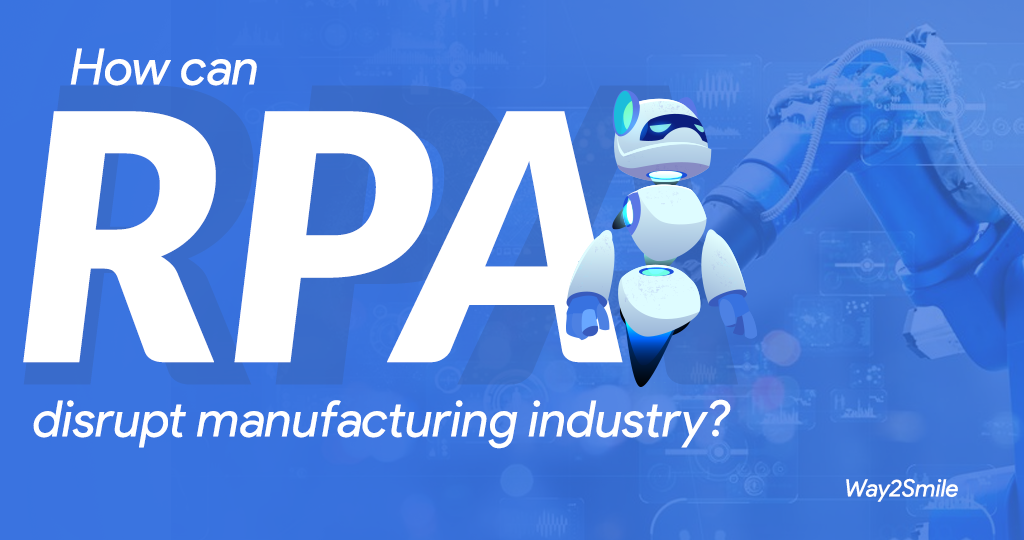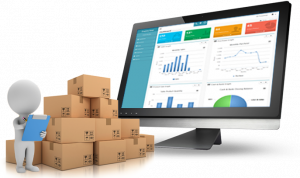How can Robotic Process Automation disrupt manufacturing industry?

Basically, all genres of people seek convenience instead of spending in more efforts toward achieving their everyday task without any predicament. For instance, people have already started to install light sensors to operate the household consumer electronics like fan, light and Thermostats etc.
Soon after the introduction to voice assistant took place amongst people they were at once got excited and utilized it for placing instruction commands and accomplish task at a much reduced effort. With this kind of people’s momentary behaviors fast changing, it is best influencing to the ubiquitous access to technology effectively at our own disposal.
In this way, your manufacturing company can arguably cut down on the most repetitive task using technology that otherwise may result to chaos if prolonged, for staffs to perform it every day. A few significant forms of technological adaptation in the manufacturing industry usually happens to be due to the early adopters of automation, robots and unit process lines which can perform the daily monotonous task at industrial plants quickly.
Conversely, if these tasks are not automated then it should lead to adversity and delay in sale, further postpone deliveries and frustrate customers by serving them with defective products. The worst thing can be, your company will end up consuming a lot of time, effort and work diligence without yielding to performances.
Therefore, Manufacturing Industries are mostly inclined to pay rapt attention towards the integration of Robotic Process Automation within production line and back office operations. The inclusion of technology components like robotics in the production line will accelerate to digital transformation processes and enhance work productivity without staff’s exasperation or industriousness.
What is RPA?
Robotic Process Automation Software provides the business operation the necessary network capacity to automate certain tasks without leaving a probe for human errors eventually, improving to the total work productivity.
RPA and Manufacturing
The benefits of using Automation in Manufacturing Industry have vastly influenced to the existence of latest technological innovations thus, reducing workload procedures and simplified process operations. It would neglect the responsibilities of the factory managers to forcibly conclude a full performance and yield out the best productivity.
However, with the repeated occurrences of anomaly in processes, almost every manufacturing unit and its leaders are kept under a loss on productivity which successively, instigates to embracing Robotic Automation Technology.
Manufacturing Companies are steadily making the digital transformation through deploying robots while conserve on human resources when,
- Assembling products
- Inspecting for quality
- Packaging units
Nevertheless, companies find it difficult to manage processes through the help of physical robots and henceforth are unlikely to dependent on the integration of RPA in Manufacturing Industry. A report study expresses the normalization on integrate RPA Solutions nearly, up to 40% to achieve Cost Savings in the manufacturing industry along with its back-end processes that includes Logistics, ERP and Product Price Comparisons.
Read Also – Why is it essential to integrate Legacy Systems with RPA?
List of RPA Techniques that disrupt Manufacturing Industry
The success levels in manufacturing can be scaled up firmly by replacing the existing industrial robots into software robots and achieve higher efficiencies on operations.
In this regard, we have enlisted the few prominent use cases of Robotic Process Automation which should likely disrupt the manufacturing industry through enhancing production with the help of automation.
1. Bill of Materials
Billing of Materials is a central document prepared in reference to keep a solid record of the procured materials and components that are in need for the creation of new products. It offers the clear insight to employee to know the specific type of material to buy, draft invoice, places to look for them and payment methods.
If this BOM document, is prepared heedlessly with mistakes that appearing in any one of the product manufacturing stages then it can seriously affect to the agility of production cycles, deterring a huge loss to the company.
Hence, RPA Techniques are instilled internal to the BOM documentation to conduct quasi error-proof task function and streamline process automation to expedite production and manufacturing on time.
2. Customer Support and Service Desk
The presence of Robotic Process Automation in customer support must greatly enhance the level of customer experience and interactions provided in the front office. With the software automation being built frequently by IT Consulting Companies it should not be a cost expensive investment for your company since, it can help you keep a check on all the employees at work, promptly delivering to customer service and resolving complaints indefinitely.
During when customer service desk is operated manually, it mandates refreshing several no of desktop screens to acquire customer’s data and then offer the best on technology solution providers for customer’s queries resolutely.
Here is when the powers of RPA can be really leveraged in the customer support by gaining complete access to all personnel data of an individual directly from a single location and start to provide technology solutions accordingly.
3. Administration and Reporting
Manufacturing Companies generally suffer when put under a tremendous workload strain in managing the various processes and this in turn directly affects to the administration inefficiencies and so forth leads to failure in production operations. The proprietary use of RPA in manufacturing industry should eliminate this workload congestion over the production line and then empower floor mangers to handle both Administration and Reporting remarkably well.
There are quite a few Digital Transformation Companies that already have invested on developing RPA Bots for maintenance of Administration Operations at Production Zones. It can help in preparing the necessary reports intuitively and accurately streamline the complete production workflows transparently.
In addition, this should prompt managers to take firm decisions internally amongst the Business Processes that are utmost essential for the company to quickly adopt to the forecast goals effectively.
4. Data Migration
Typically, all Production Units are influenced either at a minimal or maximal term plan during which they become mostly stable and reliable, were simply obtained through the regular upgrades to yield profits. This steep raise in productivity has urged in many technology solution providers to offer data migration for the manufacturing industry and refurbish data from old to new systems.
This will definitely ensure consistency in production management and identify novel components to buy therein accelerate the product manufacturing cycle excellently. On the other hand, without the data upgrades and manufacturing systems being always innately connected, it can result to the occurrence of compound errors specifically, in the manual production operations.
There are numerous types of companies slow and steady latching on to the Robotic Process Automations preferably, to accelerate performances and reduce the possibility of errors and move further towards benchmarking a lean manufacturing process that delivers to cost effective results.
Read Also – Incredible Benefits of RPA that will Power Up your Business
5. Invoice Processing
The floor manager is always kept busy on schedule while draft the invoice processing procedure calls and it could induce the sales engineer to execute a circumspect inspection and approve call procedures, regardless of the different language formats.
The reality of drafting this invoice procedure is at times susceptible since, it requires the mutual coordination of both managers and sales personnel’s working amidst the monotony of workloads. And so, leading to the failure on objectives and lower the focus amongst production floor employees.
For Instance, if an employee commits a mistake by clicking column A instead of column B then the result of invoice processing can get adverse and nearly unamendable to prevent the incidence of down time at production units. The moment software robots are utilized in invoice processing the complex nature of information acquittances from forms can be done immaculately resulting further, to draft the procedure call documents considering, authorization of multiple departments.
6. Inventory Control
The ability to pilot the Inventory Control can be a laborious task which might otherwise be easily maintained similar to how Mobile App Development Companies make their survival in market. In fact, utilizing robotic process automation will reduce speculations implied on supplier delivery and its equivalent demands set upraise by consumers that normally, results in higher productivity and inventory turnover across manufacturing sector.
All these strenuous work integrations are best performed by RPA Bots through automate email, acquisition process, converting paper forms into electronic formats and thence reiterate the capability to inventory control, that meeting to consumer demands becoming all the more practical than manually tracking inventory processes. This will disrupt operational efficiency, cost optimization and mutual interaction between the suppliers and consumers.
7. Regulatory Compliance
One of the significant process in manufacturing is regulatory compliance and in this pathway automation platforms can be utilized to build a security layer for accessing to all sensitive company information’s along with consumers and supplier’s data, without any breach in production quality.
During these times RPA Bots are deployed in quality assurance process and it offers the clear transparency and uninterrupted access to data analytics to raise a permit flag on quality check for products complete.
The next benefit on using RPA in Manufacturing Industry can be to quickly get the upgrades on multiple processes and check for its regulatory compliance effectually.
Conclusion
The versatile applications of Automation in manufacturing industry should get more prominent and recognizable internally within the core and non-core processes on a daily basis. It might provide companies which adapts to RPA Platforms a substantial increase in productivity and reduced cost on expenses.
In these competitive scenarios, when manufacturing enterprises fully integrate the RPA Technology, they definitely get to avail the ultimate advantage of efficiently handling processes like management, productivity and administration.
Over the evolution of time progresses, companies would find it proximately easy and not so difficult to execute RPA Solutions in their production unit that adjoining to the manufacturing industry.
Read Also – The Future Of RPA: 2021 Trends And Future Predictions



